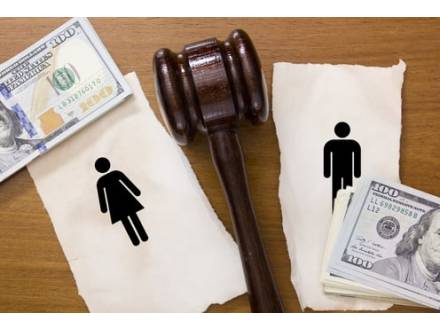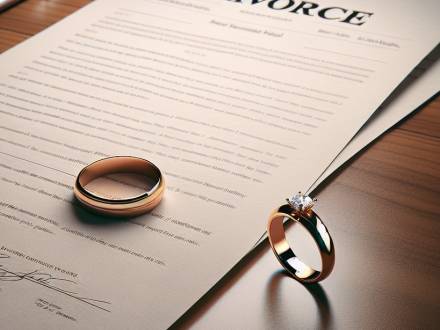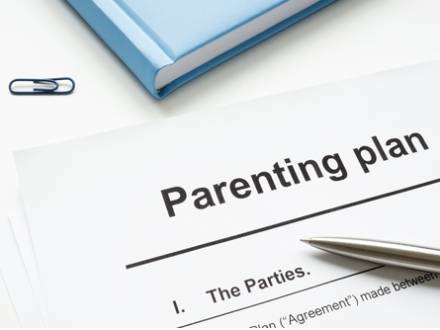Recent Blog Posts
What is the Procedure on the Day of the Prove-Up Hearing?
 Prove-up is the term used in Illinois family courts for the final court date of a divorce. This is the date set by the judge to finalize the divorce after an agreement has been reached between the spouses. Both spouses will appear before the judge, where they will be asked a series of questions to ensure that they are in agreement and that all matters have been settled.
Prove-up is the term used in Illinois family courts for the final court date of a divorce. This is the date set by the judge to finalize the divorce after an agreement has been reached between the spouses. Both spouses will appear before the judge, where they will be asked a series of questions to ensure that they are in agreement and that all matters have been settled.
The prove-up hearing represents the culmination of your divorce process. For many couples, this brief court appearance is the only time they will see the inside of a courtroom during their divorce. Understanding what happens during prove-up and how to prepare makes the experience less stressful. If you have questions about your upcoming 2026 prove-up hearing, speaking to your St. Charles, IL family law attorney can be helpful.
Do I Have to Attend the Prove-Up Hearing?
While both spouses may attend the prove-up hearing, the Petitioner (the spouse who originally filed for divorce) is usually the only one required to attend. The Respondent can choose to appear and testify, but they are not usually required to do so. The prove-up hearing can proceed without the Respondent when they have entered an Appearance and signed the agreements.
Can Conversion Reverse the Commingling of Separate Assets?
 Many spouses are stunned when they find out during their divorce that the property, gift, or inheritance they believed was their separate property turns out to be a marital asset, thanks to commingling. If a person owns a home or other property, has an inheritance, or has amassed a sizeable bank account before marriage, these assets belong to that spouse alone unless they have been commingled.
Many spouses are stunned when they find out during their divorce that the property, gift, or inheritance they believed was their separate property turns out to be a marital asset, thanks to commingling. If a person owns a home or other property, has an inheritance, or has amassed a sizeable bank account before marriage, these assets belong to that spouse alone unless they have been commingled.
Commingling occurs when a separate asset is mixed in with marital assets, changing it into a marital asset that needs to be divided in a divorce. For example, suppose one spouse owns a home that was left to them by their great aunt. If the spouse who owns the home adds the other spouse to the title, it could easily be claimed as marital property by the second spouse in divorce court.
There are other, less obvious and often unintentional ways property can be commingled. Our Kane County divorce attorney handles complex property division cases and can help you understand what your options are.
Can I Sue My Husband for Cheating in Illinois?
 When a spouse cheats, it can destroy trust and cause deep emotional pain. Is that enough to warrant legal action in Illinois? State law handles adultery differently than it once did. While cheating may affect some parts of a divorce, it is not a reason to sue a spouse. Many people find that understanding how Illinois courts view adultery helps them feel more prepared before starting the divorce process. If you are struggling with the aftermath of infidelity, speaking with a Yorkville, IL divorce lawyer can help you make informed decisions about your legal options.
When a spouse cheats, it can destroy trust and cause deep emotional pain. Is that enough to warrant legal action in Illinois? State law handles adultery differently than it once did. While cheating may affect some parts of a divorce, it is not a reason to sue a spouse. Many people find that understanding how Illinois courts view adultery helps them feel more prepared before starting the divorce process. If you are struggling with the aftermath of infidelity, speaking with a Yorkville, IL divorce lawyer can help you make informed decisions about your legal options.
Is Adultery Grounds for Divorce in Illinois?
Illinois is a no-fault divorce state under 750 ILCS 5/401(a). This means you do not have to prove that your spouse did something wrong to end your marriage. Instead, the court only needs to see that there are irreconcilable differences, meaning your marriage has broken down beyond repair.
Workers’ Compensation Benefits in Divorce
 Workers’ compensation benefits protect employees and their families after a workplace injury or illness. These benefits give financial support while a worker recovers, helping cover medical expenses and lost wages. But when a marriage ends, people wonder how these benefits are treated in a divorce.
Workers’ compensation benefits protect employees and their families after a workplace injury or illness. These benefits give financial support while a worker recovers, helping cover medical expenses and lost wages. But when a marriage ends, people wonder how these benefits are treated in a divorce.
If you are going through a divorce in Illinois in 2025 and you or your spouse are receiving workers’ compensation benefits or a personal injury settlement, you probably have questions. Our Aurora, IL divorce attorneys can help you understand how workers’ comp and other settlements are handled in a divorce and answer any other questions you have.
Are Workers’ Compensation Benefits Considered Marital Property in Illinois?
Under the Illinois Marriage and Dissolution of Marriage Act, property is categorized as either marital or non-marital during a divorce. Marital property includes assets that were acquired during the marriage, while non-marital property is usually assets one spouse owned before the marriage. Inheritance or gifts that were given specifically to one spouse may also be non-marital property.
How Do I Change My Child’s Name After an Illinois Divorce?
 After a divorce, many people change their last names as a way to mark a new chapter in life. For adults, this process is relatively simple. Usually, it is just handled as part of the divorce decree. But when it comes to changing a child’s name after a divorce, the situation is more complicated.
After a divorce, many people change their last names as a way to mark a new chapter in life. For adults, this process is relatively simple. Usually, it is just handled as part of the divorce decree. But when it comes to changing a child’s name after a divorce, the situation is more complicated.
In Illinois, both parents have legal rights to their child, including having a say in whether the child’s name can be changed. Although you may want to distance yourself from your spouse as much as possible, changing your child’s name is not always an option. As of October 2025, Illinois courts continue to apply strict name-change rules for children.
Our DuPage County family law attorneys at The Law Office of Matthew M. Williams, P.C. can help you protect your rights while keeping your child’s best interests at the center of every decision. If you are interested in changing your child’s name after divorce, talk to us to find out about your options.
Does it Matter Who Files for Divorce First in Illinois?
 Divorce is an emotionally challenging process, and it is crucial to understand the legal aspects involved to navigate it effectively. One commonly asked question is "Should I file for divorce first?" Under the Illinois Marriage and Dissolution of Marriage Act (750 ILCS 5/101), the judge’s job is to reach a fair result based on facts, rather than on which spouse filed first.
Divorce is an emotionally challenging process, and it is crucial to understand the legal aspects involved to navigate it effectively. One commonly asked question is "Should I file for divorce first?" Under the Illinois Marriage and Dissolution of Marriage Act (750 ILCS 5/101), the judge’s job is to reach a fair result based on facts, rather than on which spouse filed first.
That said, filing first can still affect some parts of the process. It can affect where the case starts, how the early motions are scheduled, and who speaks first at trial. This blog will explore the implications of being the first to file for divorce in Illinois, shedding light on the legal considerations that may arise during this crucial decision. Having an experienced St. Charles, IL family law attorney by your side can help you make the best decisions for your divorce and your future.
Understanding Temporary Custody Orders
 When a couple with minor children decides to divorce, setting up a parenting plan for the children is one of the most stressful parts of the process. No matter what the parents want, in Illinois, the court’s goal is to try to make sure that children stay in regular contact with both parents.
When a couple with minor children decides to divorce, setting up a parenting plan for the children is one of the most stressful parts of the process. No matter what the parents want, in Illinois, the court’s goal is to try to make sure that children stay in regular contact with both parents.
However, before a divorce is final, the chaos of the process may mean that children do not have a clear and consistent living arrangement. One parent may move out of the family home, or there may be an order of protection or other complications.
In such cases, a temporary custody order can protect children while parents work through the divorce. Temporary orders are designed to create stability and predictability for children. The goal is to ensure that a child’s day-to-day needs are met during a highly stressful time.
Working with an experienced Batavia child custody attorney can help the entire divorce process be more predictable. If you are hoping to get a temporary custody order, talk to us today by calling 630-409-8184 and scheduling a free consultation.
How Long Child Support Modifications Take in Illinois
 Child support orders are not permanent. Over time, you may face job changes, shifts in your parenting schedule, or new expenses for your children. The amount paid or received is based on your income, the other parent’s income, and the current parenting time schedule. When your circumstances change, the court allows you to request a modification. The amount of time it takes to get that modification can vary depending on many factors.
Child support orders are not permanent. Over time, you may face job changes, shifts in your parenting schedule, or new expenses for your children. The amount paid or received is based on your income, the other parent’s income, and the current parenting time schedule. When your circumstances change, the court allows you to request a modification. The amount of time it takes to get that modification can vary depending on many factors.
At The Law Office of Matthew M. Williams, P.C., our DeKalb County, IL child support lawyers have experience walking parents through the modification process. During your free initial consultation, we will review your situation and discuss the steps you should take first.
When Can You Modify Child Support in Illinois?
Under Illinois law (750 ILCS 5/510), child support can be modified if there is a "substantial change in circumstances." This can describe a wide range of incidents. However, it generally refers to an important, typically unanticipated, shift in your situation that makes the current order unfair or unworkable.
Prepaid Legal Services: Dangerous for an Uncontested Divorce
 Over the past two decades, prepaid legal service plans have grown in popularity. These plans promise affordable access to attorneys by allowing people to pay a small monthly fee in exchange for basic legal help. Such packages may sound appealing, especially if you are considering an uncontested divorce. However, they can come with hidden risks.
Over the past two decades, prepaid legal service plans have grown in popularity. These plans promise affordable access to attorneys by allowing people to pay a small monthly fee in exchange for basic legal help. Such packages may sound appealing, especially if you are considering an uncontested divorce. However, they can come with hidden risks.
In Illinois, all divorces — even those considered "simple" or "uncontested" — involve important decisions that affect your finances, property, and family. Relying on prepaid legal services for something as important as ending a marriage can leave you unprotected.
At The Law Office of Matthew M. Williams, P.C., our North Aurora, IL divorce attorneys have a great deal of experience guiding Kane County families through all types of divorce. We offer free consultations so you know your options from the start.
Writing a Parenting Plan for an Infant or Newborn
 For new parents, raising a baby is already a life-changing responsibility. But when parents are divorced, separated, or were never married, figuring out how to manage an infant is exceptionally difficult. Sleepless nights, feeding schedules, and the stress of providing for a newborn collide with questions about how to share parenting responsibilities, especially if you do not really know or trust your co-parent. Nevertheless, in Illinois, all parents who share custody of minor children are required to create a parenting plan, and for infants and newborns, the details must reflect the unique needs of a very young child.
For new parents, raising a baby is already a life-changing responsibility. But when parents are divorced, separated, or were never married, figuring out how to manage an infant is exceptionally difficult. Sleepless nights, feeding schedules, and the stress of providing for a newborn collide with questions about how to share parenting responsibilities, especially if you do not really know or trust your co-parent. Nevertheless, in Illinois, all parents who share custody of minor children are required to create a parenting plan, and for infants and newborns, the details must reflect the unique needs of a very young child.
At The Law Office of Matthew M. Williams, P.C., our Oswego child custody attorneys have more than 25 years of experience helping parents get through difficult separations, DCFS involvement, and custody disputes involving troubled youth. We can guide you through the process of writing a parenting plan that protects your rights and gives your child the best possible start after divorce, from infancy onward.

 630-409-8184
630-409-8184













